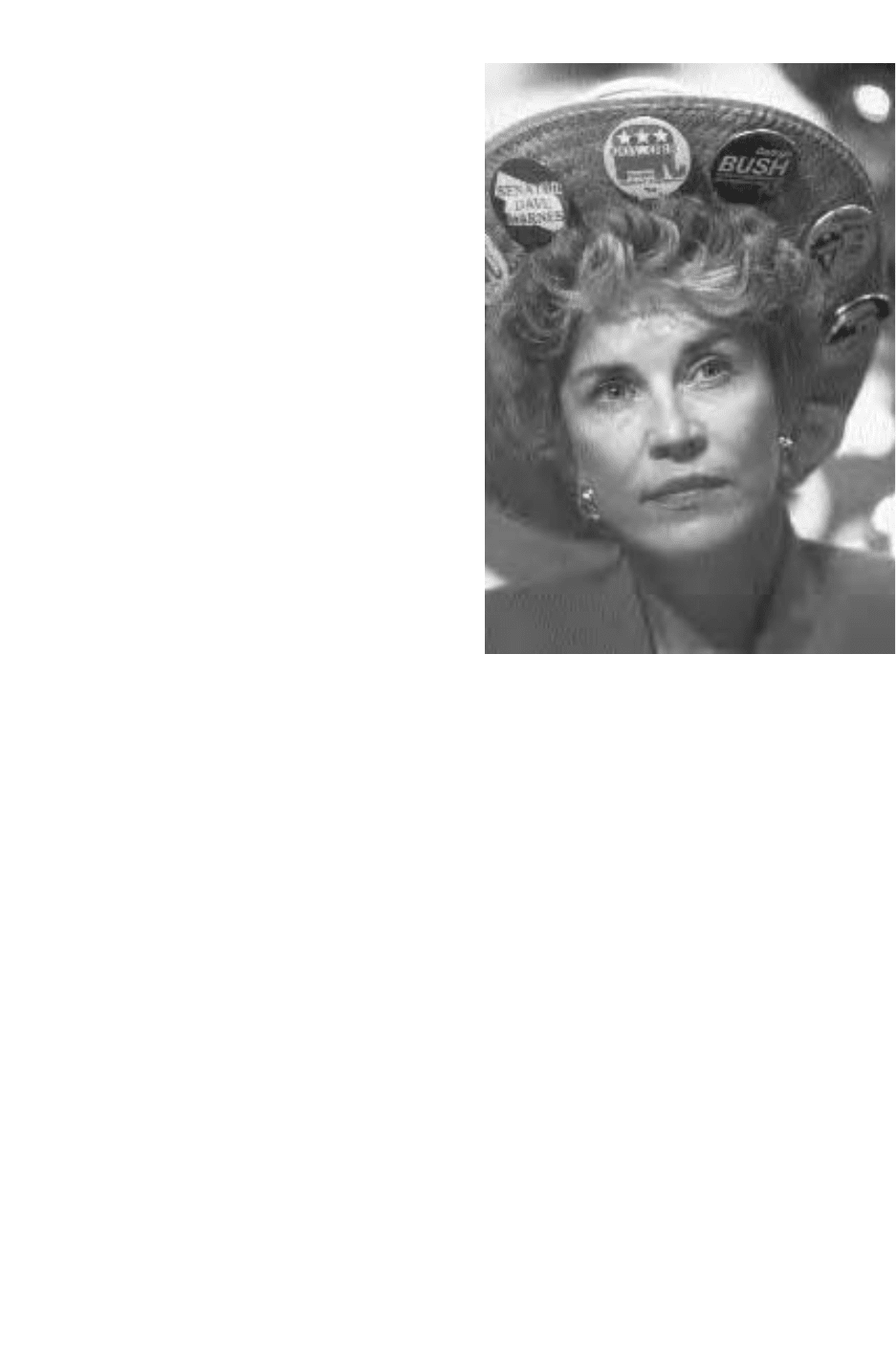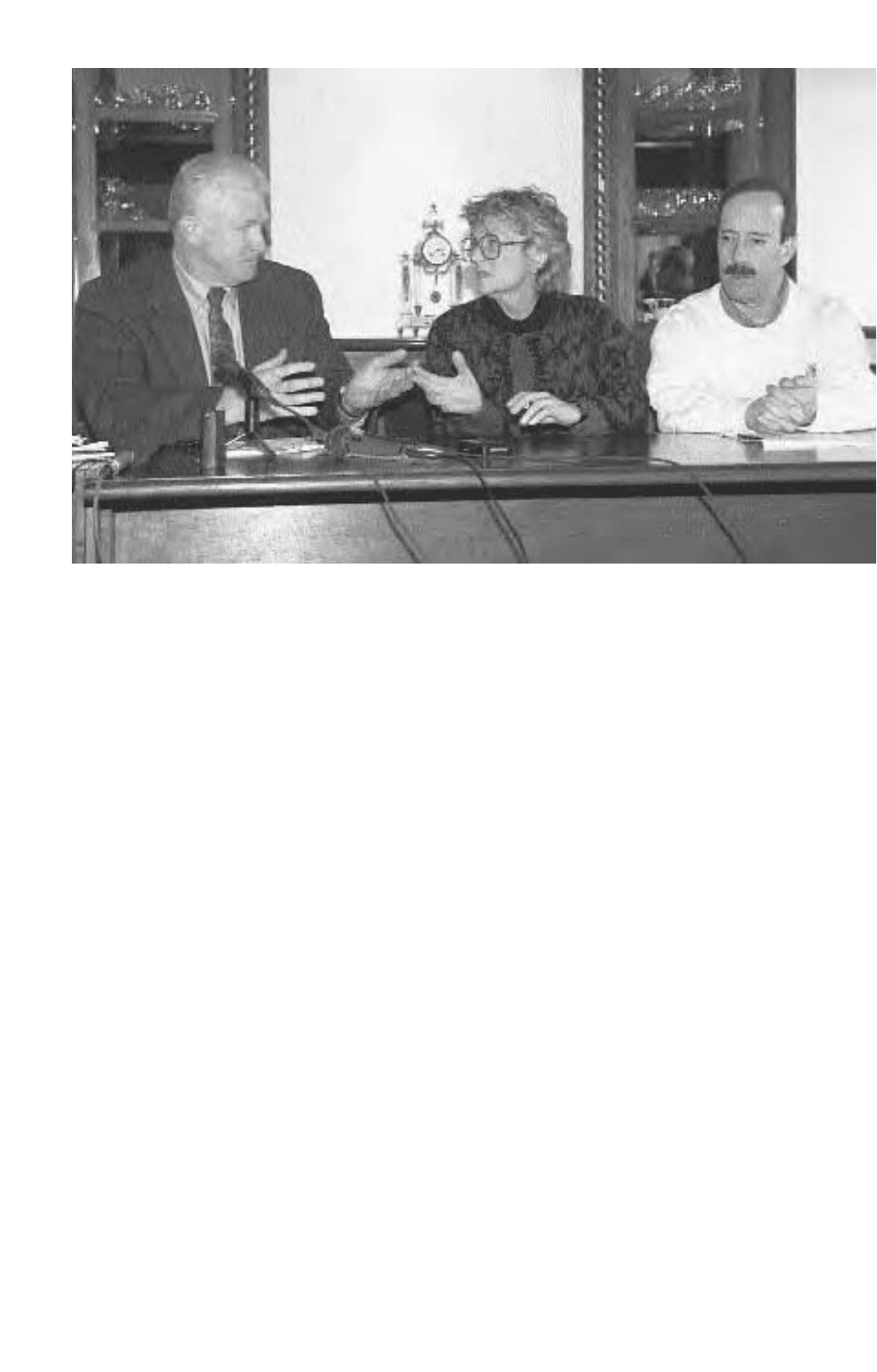Schenken Suzanne O’Dea. From Suffrage to the Senate: An Encyclopedia of American Women in Politics (2 Volumes)
Подождите немного. Документ загружается.


poverished Americans. She passed an amendment to the Law Enforce-
ment Assistance Act that denied funds to jurisdictions that discriminated
and an amendment to a revenue-sharing bill that created a civil rights
provision in it. In addition, she was instrumental in passing the Extended
Voting Rights Act in 1975, which added other people of color to the
African Americans included in the 1965 Voting Rights Act.
At the 1976 Democratic National Convention, Jordan once again
captivated listeners with her beautiful and resonant voice and her extraor-
dinary thoughts. She electrified the convention hall by saying: “We are a
people in search of a national community, attempting to fulfill our na-
tional purpose, to create and sustain a society in which all of us are equal.
I have the confidence that the Democratic Party can lead the way. We can-
not improve on the system of government handed down to us by the
founders of the Republic, but we can find new ways to implement that sys-
tem and to realize our destiny.” She did not seek a fourth term in Congress.
Jordan was diagnosed with multiple sclerosis in 1973, and by 1977 a
second attack of the disease had significantly reduced her mobility. Ini-
tially, Jordan had managed to camouflage the affects of the disease, which
became increasingly difficult after the second attack, but she steadfastly
refused to reveal the disease from which she suffered until 1988. When she
announced her retirement, she had no career plans.
In 1979, Jordan was named to the Lyndon B. Johnson Chair in Na-
tional Policy at the Lyndon B. Johnson School of Public Affairs at the Uni-
versity of Texas at Austin. For the next five years, she retreated from pub-
lic life and devoted herself to teaching.
She emerged from her self-imposed seclusion to actively campaign
for presidential candidate Walter Mondale and vice presidential candidate
Geraldine Ferraro, as well as for other Democratic nominees in the 1984
general elections. In 1987, Jordan gained increased visibility as she raised
her voice in opposition to Judge Robert Bork’s nomination for the U.S.
Supreme Court. Because he had opposed civil rights cases, she joined oth-
ers in mounting a significant campaign against Bork, who was not con-
firmed. When Ann Richards ran for governor of Texas in 1990, Jordan
helped in the campaign, serving as Richards’s ethics counsel. After
Richards’s election, Jordan met with the people Richards appointed to
state government positions and discussed ethics in government with them.
Once again, at the 1992 Democratic National Convention, Jordan
delivered a keynote address. She held the delegates’ attention by saying:
We can change the direction of America’s engine and become
proud and competitive again. The American dream is not dead.
True, it is gasping for breath, but it is not dead. However, there
is no time to waste because the American dream is slipping
Jordan, Barbara Charline 365

away from too many. It is slipping away from too many black
and brown mothers and their children; from the homeless of
every color and sex; from the immigrants living in communi-
ties without water and sewer systems. The American dream is
slipping away from the workers whose jobs are no longer there
because we are better at building war equipment that sits in
warehouses than we are at building decent housing.
As chair of the Commission on Immigration Reform from 1993 to
1996, she objected to a proposal to deny automatic citizenship to children
born in this country whose parents are illegal immigrants. She told Con-
gress: “To deny birthright citizenship would derail this engine of Ameri-
can liberty.” Jordan wrote her autobiography, Barbara Jordan: A Self Por-
trait, in 1979.
See also Congress, Women in; Democratic Party, Women in the; Ferraro,
Geraldine Anne; Richards, Ann Willis; Voting Rights Act of 1965
References H. W. Wilson, Current Biography Yearbook 1993 (1993); Jordan and
Hearon, Barbara Jordan (1979); Rogers, Barbara Jordan: American Hero (1998).
Jumper, Betty Mae (b. 1923)
The first woman to serve as chair of the
Seminole Tribal Council, Betty Mae
Jumper worked to help the tribe move to-
ward economic self-sufficiency. In 1957,
when the Seminole tribe formally orga-
nized, Jumper was elected to the tribal
council for a two-year term and then
served on its board of directors for four
years. She was elected chairperson of the
Seminole Tribal Council in 1967, serving a
four-year term, and was the first woman to
chair any tribe in North America. As chair,
Jumper worked to improve health, em-
ployment, education, welfare, and housing
conditions for Seminoles. During her
tenure, the tribe entered into land lease
and other agreements to help it move to-
ward economic self-sufficiency. Active in
the National Tribal Chairman’s Association, Jumper was a founder of
United Southeastern Tribes.
Born at Indiantown, Florida, Betty Mae Jumper completed a one-year
nursing program at Kiowa Indian Hospital in Oklahoma. She returned to
the Seminole reservation and worked with the public health nurse.
366 Jumper, Betty Mae
Betty Mae Jumper,
chief of the Seminole
Nation, 1998
(Courtesy: Seminole
Nation)

She wrote her memoir,...And with the Wagon Came God’s Word,
in 1980.
References Bataille, ed., Native American Women (1993); www.seminoletribe.com.
Juries, Women on
The English common law heritage that formed the basis of American
colonial law persisted in several aspects of women’s status, including their
service on juries. During the American colonial period, jury duty was a re-
sponsibility reserved for white men, and women’s role on juries was lim-
ited to determining if a defendant was pregnant in two situations, when
the defendant made a request to have a stay of execution until after the
birth of her child, and when a widow made the request to delay the dis-
position of her deceased husband’s estate until after childbirth. The ques-
tion of guilt or innocence was reserved for male jurors. By the end of the
colonial period, even this restricted role was removed when male medical
practitioners began deciding whether or not the defendant was pregnant
and replaced the women.
The ratification of the Sixth Amendment to the U.S. Constitution,
providing that “the accused shall enjoy the right to a speedy and public
trial, by an impartial jury of the State,” did little to change women’s roles
on juries. In addition, state constitutions written after the Revolution
adopted common law practices of trial by jury, but they did not specifi-
cally include women jurors, policies upheld by the courts.
In Stauder v. West Virginia (1879), the Supreme Court held that ex-
cluding African Americans from juries denied blacks equal protection and
due process under the Fourteenth Amendment, but the decision clearly
stated that women could be excluded. Afterward, women’s rights activists
continued to point out that women suffered a disability because women
had never been judged by a jury of their peers.
In Wyoming, women served on juries after the state constitution was
ratified in 1890, but their service did not last long. An 1892 court decision
found that women had no right to sit on juries unless specifically permit-
ted by state statute. In 1898, women in Utah became the first U.S. women
to qualify for jury service without subsequently losing the right.
With the passage of the Nineteenth Amendment granting women suf-
frage rights in 1920, a few states made women automatically eligible for
jury service. The Illinois state supreme court decided that because women
had not been voters at the time the state’s statutes on jury service had been
written, women could not serve on juries. The Illinois state legislature de-
feated bills granting women the right to serve on juries in 1923, 1925, 1927,
and 1929 and then sent the issue to the voters in 1930. The state supreme
Juries, Women on 367

court, however, ruled the referendum unconstitutional. Not until 1939
could Illinois women finally serve on juries. Connecticut women lobbied
the state’s legislature from 1921 to 1937, when they succeeded. In other
states, women argued to serve on juries as a right and began organizing
state legislative campaigns to remove the word male from jury statutes.
Opponents to women’s jury service believed that women’s obliga-
tions to their husbands and children should take precedence over their
obligations to the state. Some states, however, permitted women to serve
on juries if they went to the county courthouse and registered their will-
ingness to be jurors, making jury service a right but not an obligation.
Feminists opposed this permissive approach because if women were to be
judged by a jury of their peers, then other women had to be willing to
serve as jurors.
The permissive approach survived a challenge in the U.S. Supreme
Court in 1961, when a Florida woman convicted of murder appealed the
verdict on the basis of the all-male jury that decided her case. In arguing
the case, Hoyt v. Florida, before the Court, the Florida assistant attorney
general explained that women could not be required to serve on juries be-
cause they have “to cook the dinners!” The Court said that “woman is still
regarded as the center of the home and family life” and found permissive
jury duty constitutional.
Some changes, however, had occurred. The Civil Rights Act of 1957
made women eligible to serve on all federal juries. In 1921, thirty-seven
states excluded women from jury service, but in 1965, only Alabama, Mis-
sissippi, and South Carolina prohibited women from serving on juries. By
1973, women could serve on juries in every state, but in nineteen states
special exemptions for women remained.
In 1975, the U.S. Supreme Court reconsidered state policies that re-
quired women to register before becoming eligible for jury duty and
found them a violation of Sixth Amendment and Fourteenth Amendment
rights in Taylor v. Louisiana, ending different policies for jury service for
women and men.
See also Fourteenth Amendment; Hoyt v. Florida; League of Women Voters;
Nineteenth Amendment; Suffrage; Taylor v. Louisiana
References Lemons, The Woman Citizen: Social Feminism in the 1920s (1973);
Mead and Kaplan, eds., American Women: The Report of the President’s
Commission on the Status of Women and Other Publications of the Commission
(1965); Sachs and Wilson, Sexism and the Law (1978); Schweber, “But Some
Were Less Equal...the Fight for Women Jurors” (1979).
368 Juries, Women on

Kahn, Florence Prag (1868–1948)
Republican Florence Kahn of California served in the U.S. House of Rep-
resentatives from 2 February 1925 to 3 January 1937. Married to Con-
gressman Julius Kahn, Florence Kahn gained political experience working
with him. After he died in office, she won election to fill the vacancy.
When she entered the House, she was assigned to the Committee on In-
dian Affairs but refused to accept it, saying: “the only Indians in my dis-
trict are in front of cigar stores and I can’t do anything for them.” She re-
ceived an assignment to the committee on education and then to military
affairs, her first choice. She was the first woman to serve on the House Ap-
propriations Committee.
Kahn sought to end Prohibition because she was convinced that it
could not be enforced. A supporter of enlarging the military and estab-
lishing military bases in California, she was also instrumental in obtaining
congressional authorization for $75 million to build the San Francisco
Bay Bridge connecting San Francisco and Oakland. She lost her attempt
for a seventh term and returned to private life.
Born in Salt Lake City, Utah, Florence Kahn graduated from the Uni-
versity of California at Berkeley in 1887. She then taught high school En-
glish and history.
See also Congress, Women in
References Office of the Historian, U.S. House of Representatives, Women in
Congress, 1917–1990 (1991).
369
K

Kaptur, Marcia (Marcy) Carolyn (b. 1946)
Democrat Marcy Kaptur of Ohio entered the U.S. House of Representatives
on 3 January 1983. She has focused on revitalizing the economy of indus-
trial Ohio and promoting international trade issues relating to her district’s
interests. In addition to arguing for workers’ rights and labor and environ-
mental standards in nations that trade with the United States, she has op-
posed granting China most-favored-nation status because she believes that
Chinese workers are exploited by their government and has worked to pass
legislation prohibiting government officials from representing foreign in-
terests for one year after they leave government. Kaptur supported the con-
struction of a World War II memorial, to be financed through the minting
of fiftieth-anniversary coins. Her other priorities include technology, en-
ergy and the environment, child care in public housing, home ownership,
agriculture, and protecting individuals’ bank deposits.
Born in Toledo, Ohio, Kaptur earned her bachelor of arts degree in
history from the University of Wisconsin in 1968 and her master’s degree
in urban planning in 1974. From 1968 to 1983, Kaptur worked as an ur-
ban planner in addition to completing her graduate degree. Director of
planning for the National Center for Urban Ethnic Affairs from 1975 to
1977, she was assistant director for urban affairs in the Carter administra-
tion from 1977 to 1979. While she was pursuing a doctorate in urban
planning at the Massachusetts Institute of Technology, local party officials
recruited her to run for Congress.
Kaptur is the author of Women of Congress: A Twentieth-Century
Odyssey (1996).
See also Congress, Women in
References Congressional Quarterly, Politics in America 1994 (1993); www.
house.gov/kaptur/bio_oh09.htm.
Kassebaum Baker, Nancy Landon (b. 1932)
Republican Nancy Kassebaum of Kansas served in the U.S. Senate from 3
January 1979 to 3 January 1997. She was the first woman elected to the
U.S. Senate who was not the widow of a congressman. As chair of the For-
eign Relations Subcommittee on African Affairs, Kassebaum led the fight
for economic sanctions on South Africa as a strategy to help end
apartheid. She encouraged the United Nations to reform itself by reducing
its bureaucracy and advocated reducing the United States’ financial sup-
port to it. The first woman to chair a major Senate committee, the Labor
and Human Resources Committee, she influenced the development of leg-
islation involving education, labor relations, minimum wages, collective
bargaining, health insurance reform, and welfare reform. For example, the
370 Kaptur, Marcia (Marcy) Carolyn

Kassebaum-Kennedy Health Insurance
Reform Act of 1996 allows workers greater
portability in transferring their benefits
from one job to another. She also passed
legislation to fund research and produc-
tion of pharmaceuticals for uncommon
diseases.
A moderate Republican, Kassebaum
cofounded the Republican Majority Coali-
tion to counter the religious right in the
party. Prochoice, she supported interna-
tional family planning programs. Kasse-
baum retired from the Senate in 1997.
Born in Topeka, Kansas, Nancy Kasse-
baum earned her bachelor’s degree in po-
litical science from the University of
Kansas in 1954 and her master’s degree in
diplomatic history from the University of
Michigan in 1956. Kassebaum grew up in a
political family. Her father was Alf Landon,
governor of Kansas from 1933 to 1937 and
Republican presidential candidate in 1936. Following her marriage in
1956, Kassebaum was involved in the family’s radio stations and served on
the Kansas Governmental Ethics Commission from 1975 to 1976 and the
Kansas Committee on the Humanities from 1975 to 1979. She served on
the Maize (Kansas) School Board from 1973 to 1975.
See also Abortion; Congress, Women in
References Congressional Quarterly, Politics in America 1994 (1993); Kaptur,
Women of Congress: A Twentieth-Century Odyssey (1996).
Kee, Maude Elizabeth Simpkins (1895–1975)
Democrat Maude Kee of West Virginia served in the U.S. House of Repre-
sentatives from 26 July 1951 to 3 January 1965. Following her husband
John Kee’s election to Congress in 1932, she became his executive secre-
tary, a position she held until his death. Maude Kee won the special elec-
tion to fill the vacancy. While in Congress, she investigated veterans’ hos-
pitals, which resulted in improved conditions at them. As representative of
the largest bituminous coal–producing district in the nation, she worked
with the United Mine Workers, the National Coal Association, and the
Appalachian Electric Power Company to gain federal support for using
coal to produce electricity. She also helped attract new industry to the area
Kee, Maude Elizabeth Simpkins 371
Senator Nancy
Kassebaum (R-KS)
at the Republican
National Convention,
1998 (Corbis/Philip
Gould)

and passed measures to establish centers to train coal miners for new jobs.
She declined to seek an eighth term because of ill health. Her son James
Kee, who had been her administrative assistant, won the seat.
Born in Radford, Virginia, Maude Kee graduated from Roanoke
Business College and then was a secretary in the Roanoke Times business
office. She later wrote a syndicated weekly newspaper column.
See also Congress, Women in
References Engelbarts, Women in the United States Congress, 1917–1972 (1974);
Office of the Historian, U.S. House of Representatives, Women in Congress,
1917–1990 (1991); Tolchin, Women in Congress: 1917–1976 (1976).
Kelley, Florence (1859–1932)
Social reformer Florence Kelley played pivotal roles in the passage of wage
and hours laws to protect women workers, in the creation of the Chil-
dren’s Bureau of the U.S. Department of Labor, and in developing public
support to prohibit child labor. As secretary of the National Consumers
League, she organized dozens of local affiliates and two international con-
ferences.
Born in Philadelphia, Kelley graduated from Cornell University in
1882. She began studies at the University of Zurich in 1883, became a so-
cialist, and translated Friedrich Engels’s The Condition of the Working
Class in England in 1844 into English; it was published in New York in
1887. Over the next few years, she married, bore three children, and re-
turned to New York. In 1891, Kelley and her children moved to Illinois,
and she divorced her husband.
An investigator for the Illinois Bureau of Labor Statistics in 1892, she
reported the conditions in about 1,000 garment industry sweatshops.
Based on that research and a survey of city slums that she participated in,
Kelley developed a group of proposals to limit the hours women could
work in factories to eight hours per day and forty-eight hours per week,
ban child labor for children under fourteen years old, regulate the labor of
children fourteen to sixteen years old, and create a state factory inspector’s
office. Kelley lobbied the Illinois legislature for the package of proposals,
and in 1893, the legislature passed it. Appointed Illinois’s chief factory in-
spector in 1893, Kelley used the position to publicized the deplorable con-
ditions in which children worked. Removed from office in 1897 for polit-
ical reasons, Kelley traveled widely, speaking around the country on
improving working conditions and advocating labor legislation.
Kelley became the general secretary of the National Consumers
League in 1899 and continued to work on behalf of women and children
in the labor force. When an Oregon law limiting the number of hours that
women could work was challenged in the U.S. Supreme Court, Kelley
372 Kelley, Florence

helped recruit Louis D. Brandeis as counsel for the case and helped com-
pile the research included in the famous Brandeis brief. In Muller v. Ore-
gon (1908), the Court decided in favor of protective labor legislation for
women. Kelley continued to take her protective labor legislation message
around the country, drafted the model minimum wage law adopted by
Massachusetts in 1912, and contributed to nine states’ decisions to enact
minimum wage legislation.
To address the problems of child labor, Kelley and Lillian Wald had
organized the New York Child Labor Committee in 1902 and the National
Child Labor Committee in 1904. Wald and Kelley sought the creation of a
federal children’s commission and developed support for it among settle-
ment house workers and other social reformers. Congress established the
Children’s Bureau in 1912 to gather information about children in the la-
bor force. After Congress passed a bill limiting child labor and the U.S.
Supreme Court found it unconstitutional, Kelley turned her attention to
passing a child labor amendment.
Kelley was a founding member of the National Association for the
Advancement of Colored People and worked in the suffrage movement.
See also Child Labor Amendment; Children’s Bureau; Congressional Union;
Muller v. Oregon; National Association for the Advancement of Colored
People, Women in the; National Consumers League; Protective Legislation;
Suffrage; Wald, Lillian D.; Women’s International League for Peace and
Freedom
References Sklar, Florence Kelley and the Nation’s Work (1995); Trattner, Crusade
for the Children: A History of the National Child Labor Committee and Child
Labor Reform in America (1970).
Kelly, Edna Patricia Kathleen Flannery (1906–1997)
Democrat Edna Kelly of New York served in the U.S. House of Represen-
tatives from 8 November 1949 to 3 January 1969. Kelly entered politics
following her husband’s death in 1942. With the encouragement of a po-
litical leader who had been a friend of her husband’s, Kelly revived the
women’s auxiliary of the Madison Democratic Club and joined the staff
of the Democratic Party delegation in the New York legislature. The
Democratic Party chose her for its nominee to fill a vacancy created by an
incumbent’s death. In her campaign, Kelly pledged to work for issues she
believed to be important to women, including an investigation of milk
prices, opposition to excise taxes, and the creation of day care centers.
An expert in foreign policy, particularly on the Soviet bloc, she sup-
ported the North Atlantic Treaty Organization (NATO) as a defense
against communism and helped write the legislation that created the
Peace Corps. She consistently opposed any programs that would provide
Kelly, Edna Patricia Kathleen Flannery 373

aid to Communist nations, particularly Yugoslavia, and successfully
passed amendments that excluded those nations from aid programs. She
passed a measure leading to an international effort that resettled more
than 1.5 million displaced persons, primarily of Eastern European and
Russian descent, following World War II. She was also instrumental in
sponsoring measures that provided financial assistance to educational and
health institutions in Israel. She held the leadership position of secretary
of the Democratic Caucus in the 83rd, 84th, and 88th Congresses (1953–
1955, 1955–1957, and 1963 to 1965) and was Democratic national com-
mitteewoman for New York from 1956 to 1968. Redistricting in 1968
placed her and another incumbent in the same congressional district, and
despite a spirited primary campaign, Edna Kelly lost the election.
Born in East Hampton, New York, Edna Kelly earned her bachelor of
arts degree from Hunter College in 1928.
See also Congress, Women in; Democratic Party, Women in the
References Engelbarts, Women in the United States Congress, 1917–1972 (1974);
H. W. Wilson, Current Biography: Who’s News and Why, 1949 (1949); New York
Times, 17 December 1997; Tolchin, Women in Congress: 1917–1976 (1976).
Kelly, Sue W. (b. 1936)
Republican Sue Kelly of New York entered the U.S. House of Representa-
tives on 3 January 1995. Congresswoman Kelly has worked to balance the
budget, create opportunities for small businesses, and eliminate the capi-
tal gains tax. She supports reproductive rights, capital punishment, a pres-
374 Kelly, Sue W.
Representative Sue
Kelly (R-NY), with
Representative Jim
Moran (D-VA) and
Representative Eliot
Engel (D-NY), held a
press conference
about being denied
entry into Yugoslavia
to monitor elections
of ethnic Albanians
in Kosovo, 1998
(Associated Press AP)
